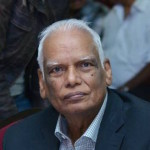Federalism Is Good For The North, But Better For The South!

On April 26, 2017 Dr. Rajitha Senaratne, Minister of Health, Nutrition and Indigenous Medicine delivered the keynote address at the SJV Chelvanayakam’s 40th death anniversary commemoration held at Kathiresan Hall, Bambalapitiya. The function was organized by the llankai Tamil Arasu Katchi (ITAK) the party founded by Chelvanayagam on December 18, 1949 after he broke off from the All Ceylon Tamil Congress (ACTC). TNA Jaffna District Member of Parliament M. A. Sumanthiran presided. R. Sampanthan, MP and Leader of the Opposition and the TNA leader also addressed the meeting.
In his keynote address Minister Rajitha Senaratne has posed the question FEDERALISM: WHY ONLY FOR TAMILS? Naturally the Minister’s query has evoked much discussion by way of pros and cons in political circles. Dayan Jayatilleka, an ultra-Sinhala Buddhist nationalist and reputed to be the political advisor to Mahinda Rajapaksa has written an article in response titled “Sinhala Federal Party.”
Very few Sinhalese politicians come forward to support federalism; if they dare it will be considered as sacrilege and condemned roundly. Therefore, we must congratulate Minister Senaratne for speaking his mind on a controversial, but a burning topic. It is the first time someone like Minister Senaratne has posed the question FEDERALISM: WHY ONLY FOR TAMILS? and then answers: A Federal Union of Ceylon would have allowed the Sinhala South to take their destiny into their own hands, in their own regions.”
Minister Senaratne’s explanation on the need for Federalism was simple. It allows people in different regions to take care of their day to day responsibilities including their cultural life, while politically acting together as a single Nation State.
Let me quote extracts from his speech somewhat extensively for the benefit of the readers.
(1)We must ask, why Federalism to Tamils? Why not to the Sinhalese in the South? We need Federalism for South because centralised powers from 1947 Parliament to 2017, for 70 years, have failed to develop the rural Sinhala society.
(2) If Federalism leads to “separation”, Velupillai Prabhakaran would have first negotiated for a Federal System. He would have been the hard line campaigner to have the “Oslo Declaration” signed in December, 2002 to be enforced without delay. The Norwegian facilitated peace deal was declared as signed between the GOSL and the LTTE on 05 December with Anton Balasingham, the chief negotiator for the LTTE announcing” that is what we decided, that we will opt for a Federal model. This Federal model will be within united Sri Lanka which will be appreciated by the Sinhalese people I suppose.”
(3) If Prabhakaran was as convinced as the Sinhala extremists that Federalism leads to a “separate” State, he would have been the first to demand a Federal System.
(4) But why Chelvanayagam wanted a Federal State was for simple reasons? That was to take care of their day to day responsibilities including their cultural life in the North-east, while acting together as a single Nation State.
(5) As the first National Convention of the ITAK in 1951 resolved, “…..It is their (Sinhala and Tamil) common motherland and with a view to promoting and maintaining national goodwill and close co-operation with the Sinhalese people.” The “common motherland” that “Thanthai” Chelva stood for and believed would be best served as a “Federal Union of Ceylon”, would not have allowed Prabhakaran his dream of an “Eelam” State. A “Federal Union of Ceylon” instead would have allowed the Sinhala South to take their destiny into their own hands, in their own regions.
(6) Centralised power in Colombo even before this free market economy left the Southern districts too poor and lacking in socioeconomic development. In just 20 years since independence, the Sinhala youth in rural South decided to rebel against the State, for a better future. The JVP began organising their armed insurrection from 1968. It was the marginalised rural poor that served as recruits for the 1971 insurgency. After the economy was completely liberalised in 1978, majority Sinhala Districts outside the Western Province could only supply cheap labour to heavily exploiting export manufacturing sector and soldiers to a war that was not theirs. War brought sealed coffins to villages and robbed youth in their prime as “missing in action”.

